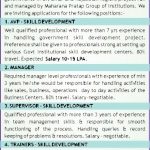Unlock Your Potential: Skill Development Levy Tanzania – Empowering Growth And Opportunities With Us!
Skill Development Levy in Tanzania: Promoting Economic Growth and Employment
Introduction
Dear Readers,
2 Picture Gallery: Unlock Your Potential: Skill Development Levy Tanzania – Empowering Growth And Opportunities With Us!


Welcome to this informative article on skill development levy in Tanzania! In this article, we will explore the details of this levy and its impact on the country’s economic growth and employment opportunities. Tanzania has recognized the importance of investing in skills development to enhance productivity and competitiveness in the global market. The skill development levy is one of the strategies employed to achieve this objective. So, let’s delve into the intricacies of this levy and understand its significance.
What is Skill Development Levy?

Image Source: thecitizen.co.tz
🔎 The skill development levy is a financial contribution imposed on employers in Tanzania to fund training and development programs for their employees. It is a way to ensure continuous improvement of skills in the country’s workforce. The levy is collected by the Vocational Education and Training Authority (VETA), a government agency responsible for overseeing and promoting technical and vocational education and training.
🔎 The funds collected through this levy are utilized to provide training programs, establish and maintain training institutions, and develop relevant curricula that align with the needs of industries and the labor market.
Who is Required to Pay the Skill Development Levy?
🔎 All employers in Tanzania, regardless of their size, are required to pay the skill development levy. This includes both public and private sector employers, as well as employers in the informal sector who have employees.

Image Source: payspace.com
🔎 The levy is applicable to employers with a total annual payroll above a certain threshold, which is determined by the government. The specific rates and thresholds may vary depending on the sector and size of the employer’s workforce.
When is the Skill Development Levy Paid?
🔎 The skill development levy is paid on a monthly basis. Employers are required to calculate the levy based on their monthly payroll and remit the funds to VETA within a specified timeframe.
🔎 Failure to pay the levy on time may result in penalties and legal consequences. Therefore, it is essential for employers to comply with the payment schedule to avoid any disruptions to their business operations.
Where is the Skill Development Levy Utilized?
🔎 The funds collected through the skill development levy are utilized in various ways to promote skills development in Tanzania. These include:
1. Establishing and maintaining vocational training centers across the country.
2. Developing and updating curricula that are relevant to the needs of industries and the labor market.
3. Conducting training programs and workshops to enhance the skills of employees.
4. Supporting apprenticeship programs to provide practical training opportunities.
5. Enhancing the capacity of vocational training institutions through infrastructure development and resource allocation.
6. Collaborating with industry stakeholders to identify skill gaps and develop targeted training initiatives.
Why is Skill Development Levy Important?
🔎 The skill development levy plays a crucial role in fostering economic growth and employment in Tanzania. Here are some reasons why it is important:
1. Skills Development: The levy ensures that employers invest in training and development programs for their employees, which enhances their skills and contributes to improved productivity.
2. Employability: By providing relevant training programs, the levy increases the employability of individuals, especially in sectors where skilled workers are in high demand.
3. Industry Competitiveness: A skilled workforce is essential for industries to remain competitive in the global market. The levy supports the development of industry-relevant skills, enabling businesses to stay ahead.
4. Job Creation: By investing in skills development, the levy contributes to the creation of new job opportunities, particularly in sectors that require specialized skills.
5. Economic Prosperity: A skilled workforce drives economic prosperity by attracting investments, increasing productivity, and generating sustainable growth.
How is Skill Development Levy Calculated?
🔎 The calculation of the skill development levy is based on the total monthly payroll of an employer. The levy rate is determined as a percentage of the total payroll, which may vary depending on the sector and size of the workforce.
🔎 The specific calculation formula and rates are determined by the government and communicated to employers through official channels. It is essential for employers to stay updated with the latest guidelines to ensure accurate calculation and timely payment of the levy.
Advantages and Disadvantages of Skill Development Levy
Advantages:
1. 👍 Increased Skills: The levy ensures that employees receive continuous training, leading to enhanced skills and improved work performance.
2. 👍 Industry Relevance: Training programs supported by the levy are designed to align with industry needs, ensuring that skills acquired are relevant and in demand.
3. 👍 Employment Opportunities: By investing in skills development, the levy contributes to the creation of more job opportunities, particularly in sectors that require specialized skills.
Disadvantages:
1. 👎 Financial Burden: The levy imposes an additional financial burden on employers, especially for those operating in sectors with low-profit margins.
2. 👎 Administrative Complexity: Complying with the levy regulations and managing the administrative requirements can be challenging for some employers, especially small businesses.
3. 👎 Informal Sector Exclusion: The levy may not be applicable to employers in the informal sector who do not have a formal payroll system, which potentially excludes a significant portion of the workforce.
Frequently Asked Questions (FAQs)
Q1: Is the skill development levy applicable to all employers in Tanzania?
A1: Yes, all employers, including those in the public and private sectors, are required to pay the skill development levy.
Q2: How often is the skill development levy paid?
A2: The levy is paid on a monthly basis, and employers are required to remit the funds to VETA within the specified timeframe.
Q3: What happens if an employer fails to pay the skill development levy?
A3: Failure to pay the levy on time may result in penalties and legal consequences, which can disrupt the employer’s business operations.
Q4: Can employers claim tax deductions for the skill development levy paid?
A4: Yes, employers are eligible for tax deductions for the amount paid as skill development levy, subject to the tax laws and regulations in Tanzania.
Q5: How are the funds collected through the skill development levy utilized?
A5: The funds are utilized to establish and maintain vocational training centers, develop industry-relevant curricula, conduct training programs, and support apprenticeship initiatives.
Conclusion
In conclusion, the skill development levy in Tanzania is a significant mechanism for promoting skills development, economic growth, and employment opportunities. By investing in training and development programs, Tanzania aims to enhance the skills of its workforce, improve industry competitiveness, and drive economic prosperity. While the levy imposes a financial obligation on employers, its advantages in terms of increased skills, industry relevance, and job creation outweigh the disadvantages. It is crucial for employers to comply with the levy regulations and contribute towards a skilled and prosperous Tanzania.
Final Remarks
Dear Readers,
Thank you for taking the time to read this comprehensive article on skill development levy in Tanzania. It is our hope that this article has provided you with valuable insights into the importance and impact of this levy on skills development, economic growth, and employment in the country. As Tanzania continues to strive for progress, investing in skills development is crucial for a prosperous future. Should you have any further questions or require additional information, please do not hesitate to reach out to us. Together, let’s build a skilled and prosperous Tanzania!
This post topic: Offline Classes

